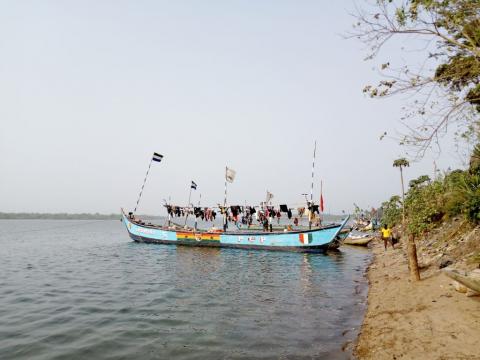By Kemo Cham in Pujehun
Residents of the fishing community of Solima and its neighbourhood in the southern Pujehun district have lamented over a “worrying” trend of low fish catches which they blame partly on the activities of foreign fishing vessels.
Solima, located in Sorogbema Chiefdom, is one of the most prominent fishing areas in Sierra Leone. It is the largest and most important fishing community in the entire Pujehun District.
Community leaders say since September last year they have witnessed a declining fish catch.
The Town Chief, Siaka Massaquoi, said the situation became worst in January, noting that since then many families had been barely surviving. He said fishermen spent long hours at sea only to return to shore with near empty boats.
“Some people come empty handed, just as they went to sea,” Chief Massaquoi told Politico, noting that the situation was so bad that it had led to increased crime in the community of about 900 people. He said some of the youth had taken to thieving and other acts of banditry to make ends meet.
The chief said the lucky few fishermen who managed to catch some fish sold them at exorbitant prices.
“They prefer selling it to people in other communities because they get more money from there,” he said.
Solima is located at the southernmost end of Sierra Leone, at the
border with Liberia, where the Moa River, which runs through the district, meets the Atlantic Ocean.
The route is a popular entry point for larger fishing boats from neighbouring countries. And foreign vessels from Asia almost constantly line the ocean and occasionally venture into the prohibited five-mile zone preserved for the local artisanal fishermen.
Besides the effect of some of their illegal fishing activities, which deplete the fish stocks, these trawlers also destroy nets set up by the local fishermen.
Due to its strategic location, Solima is inhabited by both Sierra
Leoneans and other nationals from neighbouring countries, particularly Ghana. There is a whole community of Ghanaians here who operate the Fanti boats, which are larger than the predominantly paddle canoes used by most of the indigenous fishermen.
Locals say these Fanti boats also destroy their nets at sea. But, says youth activist Ibrahim Bengeh, most of the complaints are against the foreign trawlers which he says pose the greatest threat to their livelihoods as they constantly evade arrest when they destroy their nets.
Across the river from Solima is a stretch of beaches lined with over 50 predominantly fishing communities in Kpaka Chiefdom. They all rely on Solima for protection.
In one of these villages, Liya Kpaka, the fishermen are angry with the government which they say has failed to protect them against the destructive activities of the intruding foreign vessels.
They say despite the huge license fee levied on them, the Local
Council does nothing when they call for help.
"Fishing is our life. It's all we do here. The rice we eat... even to
buy 'Maggi' and pepper to cook and sugar…we depend on our fishing. The government asks us to pay a lot of money as license fee and when we have problems they don't do anything to help us,” said fisherman Munda Dasama of Liya Kpaka.
Solima is home to one of three naval bases of the marine wing of the Republic of Sierra Leone Armed Forces (RSLAF). But the community people say the navy is ill-equipped to protect the sea, leaving the foreign trawlers, mostly Chinese owned, to overrun the waters.
The lone representative of the Ministry of Fisheries and Marine Resources in the community, Fisheries Officer Elkeline T. Kposowa, is entirely dependent on the Joint Marine Committee (JMC) for support to protect the local fisher folks against the trawlers. The JMC comprises representatives of the local authorities, the Fisheries Ministry, the Navy and Marine Police. He said he could only act when backed by the Navy and Marine police who are armed.
“They [navy] have only one boat which is not in a good condition,” Kposowa said, adding that the huge cost involved in operating the boat even when it’s in good shape also constantly limited their response capacity to the illegal activities of the trawlers.
The District Council says it is powerless to handle the trawlers.
Chief Administrator of the Council, Mohamed Arafang Kabba, said they were also regrettably losing huge revenue due to their inability to police the waters. He added that they relied on the Fisheries Ministry.
The boundary between the Moa River and the Ocean is just about three miles away from the Solima community. The local fishermen say this boundary, which they call ‘Bad Mouth’, is dangerous to cross with their largely rickety boats.
Chief Massaquoi said the nature of their boats made it difficult for the local fishermen to compete with the Fanti boats and trawlers. He therefore appealed to the government to provide them with proper boats and other fishing gear to enable them to compete for the declining fish stock. He also called for the government to empower the navy to enable it respond accordingly to the threat of the foreign trawlers.
Copyright © 2020 Politico Online








